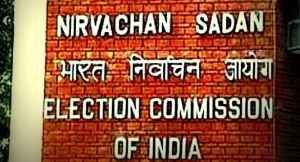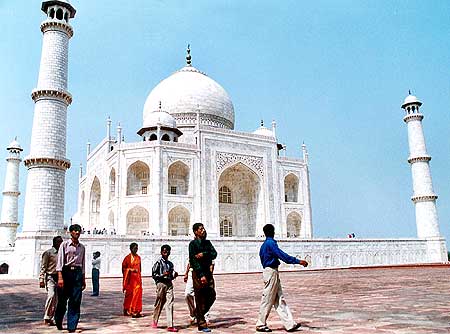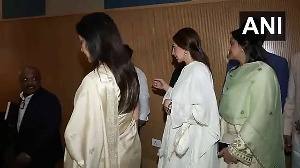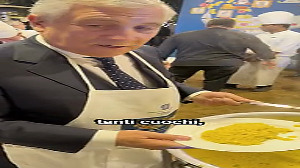 Innovative methods like transfer of funds through the RTGS banking system and concealment of currency wads inside car bonnets were detected by Election Commission as it took steps to curb the use of black money during the just-concluded Lok Sabha polls.
Innovative methods like transfer of funds through the RTGS banking system and concealment of currency wads inside car bonnets were detected by Election Commission as it took steps to curb the use of black money during the just-concluded Lok Sabha polls.
The poll panel's election expenditure monitoring wing, under its Director General (Expenditure) PK Dash, seized total cash of Rs 313 crore and 2.25 crore litres of liquor along with other illegal inducements for bribing voters during the recently held parliamentary and assembly polls.
"As a fear was created among miscreants, they were constantly changing methods. For example, since vehicles were being checked, it was noticed that some carried cash in the bonnet of the vehicle and, when it was recovered, the currency notes were burnt and the teams seized half-burnt notes.
"Similarly, Rs 8.31 crore in cash being carried on the roofs of buses in five bags was also seized. Cash was being transferred through Real Time Gross Settlement to accounts of voters. Several innovative methods were being adopted to avoid being caught by the checking teams," Dash told PTI.
Under RBI rules, the minimum amount that can be sent through the RTGS system is Rs 2 lakh.
Dash said that notwithstanding the innovative means, EC and its teams were able to effectively contain black money use in the polls.
Talking about the recent raising of the ceiling of expenditure for candidates for Lok Sabha and assembly polls, Dash said the current limit of Rs 70 lakh for Lok Sabha candidates and Rs 28 lakh for assembly poll contestants was "adequate".
Dash said EC's evaluation was that 80 per cent of the candidates show less than 90 per cent of the ceiling amount in their election expense statements after the polls are over.
"During the all-party meeting held just before Lok Sabha polls, it was demanded that the existing ceiling of 40 lakh be revised. Hence, the commission recommended that it be raised to Rs 70 lakh. This was done keeping in view the inflation rate, increase in number of voters and, consequently, the number of polling stations and also changes in method of campaigning due to changes in information, communication and technology techniques.
"Some argue that the current ceiling of Rs 70 lakh is not sufficient, while others say that the limit is too high and will lead to corrupt practices as many cannot afford (to spend) Rs 70 lakh in view of the low average income of people. The question arises here what should be the ceiling? The reality is quite different. Eighty per cent of the candidates show less than 90 per cent of the ceiling in their election expense account," he said.
He said the candidates have a good sum which they are allowed to spend under the ceiling as the expenditure incurred by parties during campaigning is not added to their contestants' accounts. The ceiling for candidates is applicable only for expenses incurred by them from the date of filing of their nominations.
Dash, who has headed the exclusive EC wing since its inception in 2010, said that raising the expenditure ceiling for candidates would not serve any purpose.
"Parties can spend any amount as, under existing laws, there is no ceiling on their expenses. In view of this, I consider the existing ceiling is adequate for the candidates who campaign by just means.
"On the contrary, even if the ceiling is raised, it will not be sufficient for those who indulge in distribution of cash, liquor and bribes.
"I raise a question for those who demand a higher ceiling. Will those who indulge in distribution of bribe and liquor at all show such expenses in their accounts? The answer is obviously no as these are corrupt practises and they use black money for such illegal activities," he said.
The DG said it was a "tough challenge" to control the use of money power in elections as India has a "cash economy".
He added that EC's maiden step of creating a pool of various intelligence and enforcement agencies to curb black money use during polls had paid off.
"It was the first time that such a step was taken. It was very effective as they (agencies) shared real-time information and took prompt action. It helped in coordination among the departments. The seizure figure shows effectiveness of the measures," he said.
Dash said the counter action against black money was meticulously planned.
"More than 11,000 flying squads were formed (covering) all constituencies to attend to the complaints of bribery along with a similar number of static surveillance teams to check transport of cash, liquor and (inducements). The entire checking was done in the presence of an executive magistrate and was also video-graphed, which can be made available to any member of the public," he said.
CCTVs were installed at all liquor distilleries and warehouses for close monitoring. Sale of liquor and storage was monitored on a day-to-day basis and if there was any increase in sale or stocks at any outlet on any day compared to last day and last year, it was kept under strict watch, he said.
Chartered aircrafts were also kept under surveillance, the top EC officer said, adding that video teams were deployed to record all major expenses like big public rallies in case of candidates who had the potential to spend more.
"Income Tax department kept close watch on the movement of black money in the constituencies. Banks were asked to send cash withdrawal reports every day to election officials," he said.










